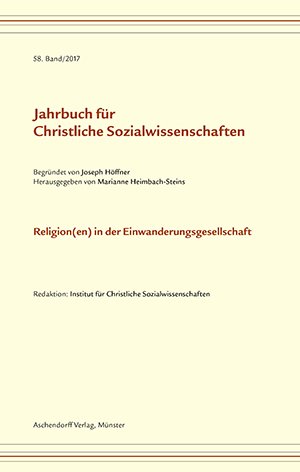Potenziale religiöser Akteure für das Zusammenleben von Religionsgemeinschaften in radikal pluraler Einwanderungsgesellschaft – Situationsbeschreibung und systematische Reflexion
Abstract
Zusammenfassung
Die verstärkte Berücksichtigung von Religionen in der Wohlfahrtsforschung und die wachsende Pluralisierung europäischer Gesellschaften aufgrund von Einwanderung ziehen die Frage nach sich, welche Rolle muslimische Akteure im Bereich sozialer Dienste spielen können. Im Sinne einer „affirmativen Genealogie“ kann das deutsche Wohlfahrtssystem als notwendig offen gegenüber religiösem Pluralismus und sozialem Wandel verstanden werden. Muslimische Aktivitäten im sozialen Bereich besitzen bislang den Charakter von Selbsthilfe, die auch den Ursprung für bestehende Wohlfahrtsverbände bildete. Staatliche Förderung im Bereich der Flüchtlingshilfe führt muslimische Akteure zunehmend an das System der Freien Wohlfahrtspflege heran. Legitimationsdiskurse muslimischer Dachverbände, theologische Begründungen und die Interaktion mit anderen religiösen Trägern stellen weitere, teils ambivalente Faktoren auf dem Weg von der Selbsthilfe hin zu universalen Hilfeleistungen dar. Die Einbeziehung muslimischer Akteure in das Wohlfahrtssystem ist beispielhaft für die Herausforderung, soziale Potenziale zu nutzen, ohne dadurch zivilgesellschaftliche Dynamiken einzuschränken.
Abstract
The recent focus of welfare research on religions and the increasing pluralization of European societies via migration raise the question what role Muslim actors might play in the field of social services. In the sense of an “affirmative genealogy”, the German welfare system can be understood as open to religious pluralism and social change. So far, Muslim social action mainly exhibits the characteristics of self-help, which is also the origin of existing welfare organisations. State support in the field of refugee aid contributes to the inclusion of Muslim agents and organizations in the non-statutory welfare sector. The discursive legitimization strategies of Muslim umbrella organisations, Muslim social thought and the interaction with other faith-based associations can be further, sometimes ambivalent, factors of transforming self-help into universal offers. The case of the integration of Muslim actors into the welfare system can be seen as paradigmatic for the challenge of taking advantage of a high social potential without limiting the dynamics within civil society.

